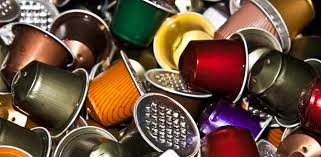 The rise and rise of the coffee pods – those tiny plastic and foil single-serving capsules that mean making a cup of fresh filter coffee is as easy as pressing a button – are emerging as one of Britain’s biggest environmental headaches, it seems.
The rise and rise of the coffee pods – those tiny plastic and foil single-serving capsules that mean making a cup of fresh filter coffee is as easy as pressing a button – are emerging as one of Britain’s biggest environmental headaches, it seems.
With millions being used across the UK, one expert on recycling and waste disposal says that they’re a horrendous waste of resources which can only be burned or sent to landfill.
The BigGreen.co.uk company says that coffee pods, increasingly popular in both places of work and in the home might seem the most convenient way to enjoy a cup of coffee, but this convenience is wrapped up in waste throughout the process, a fact of which 95% users are ignorant.
Coffee pod machines always struck us as the solution to a problem that didn’t exist in the first place. It wasn’t as if using a filter coffee machine was that difficult anyway.
That hasn’t stopped the surge in sales of coffee pods. According to a report in The Grocer trade magazine, UK sale of the capsules were nearly £87million in the year to August 2014, and are expected to top £100million in 2015.
- That’s approximately 350million empty pods going in the bin in the last year alone.
- Laid end-to-end, that’s the distance from London to Calcutta
- The rise in coffee pods corresponds to a 10% fall in sales of instant coffee
Businesses now seem to be the biggest culprit for the tide of coffee pod waste, BigGreen.co.uk says. Not only are they ubiquitous in waiting and reception areas, but they’re also being offered to staff as a means to replace canteen facilities.
A straw poll by BigGreen.co.uk found:
- 35% of businesses had changed from filter coffee to pod coffee
- Another 38% said they were considering a move to pod coffee this year
- 95% said they were unaware that the used pods couldn’t be recycled
It seems the coffee pod has taken over. And BigGreen.co.uk operators say that general waste from companies is now heaving with used coffee capsules.
There’s very little we can do to recycle these things, and they end up either going straight to landfill, or being directed to energy recovery.
- UK landfill sites are fast reaching capacity, with only very limited scope for opening new sites due to complex planning regulations and local opposition
- ‘Energy recovery’ is the burning of waste to generate electricity
On the other hand, at least glass jars from good old-fashioned instant coffee are readily recycled, while used grounds from filter coffee can be composted, BigGreen.co.uk says, adding that everything about coffee pods is convenience at a greater all-round expense.
Coffee pod machines appear to be all about offering a “premium experience” to the user, usually at a premium price. You need to buy an expensive machine. And then you need to buy the pods that go with it, and they’re usually more expensive per cup than filter coffee.
What happens when they stop making the pods for that machine? Another electrical item for the scrap heap, which creates more WEEE.
BigGreen.co.uk urges both householders and businesses to think carefully before investing in coffee pods. If you’re the kind of person that cares about the environment, you might want to wait until a green alternative emerges. And right now, the paper filter machine IS that green alternative.
Mark Hall is spokesman for BigGreen.co.uk. This article was adapted from a press statement.






